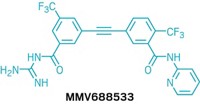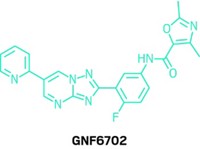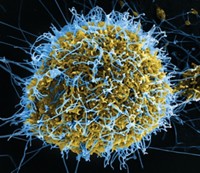Advertisement
Grab your lab coat. Let's get started
Welcome!
Welcome!
Create an account below to get 6 C&EN articles per month, receive newsletters and more - all free.
It seems this is your first time logging in online. Please enter the following information to continue.
As an ACS member you automatically get access to this site. All we need is few more details to create your reading experience.
Not you? Sign in with a different account.
Not you? Sign in with a different account.
ERROR 1
ERROR 1
ERROR 2
ERROR 2
ERROR 2
ERROR 2
ERROR 2
Password and Confirm password must match.
If you have an ACS member number, please enter it here so we can link this account to your membership. (optional)
ERROR 2
ACS values your privacy. By submitting your information, you are gaining access to C&EN and subscribing to our weekly newsletter. We use the information you provide to make your reading experience better, and we will never sell your data to third party members.
Pharmaceuticals
Novel Antimalarial Agent Has New Mode Of Action
Drug Discovery: Quinoline diamine blocks protein translation in malaria parasite, interfering with multiple stages of the organism’s life cycle
by Judith Lavelle
June 19, 2015
| A version of this story appeared in
Volume 93, Issue 25

A new chemical agent effective against a malaria parasite at multiple life stages has joined the ranks of potential new treatments. Researchers at the University of Dundee, in Scotland, have discovered a quinoline diamine that blocks protein translation in Plasmodium falciparum, a malaria parasite, and eventually kills the organism (Nature 2015, DOI: 10.1038/nature14451).
Antimalarial drugs typically interfere with only one stage of the parasite’s life cycle. But the new compound, called DDD107498, may not only treat malaria patients but also protect people from acquiring the disease and prevent carriers from spreading it.
To discover the new compound, the researchers screened a library of more than 4,700 small molecules. Then they chemically optimized their best hit, increasing its potency 120-fold. When given to mice infected with malaria, a single dose of the agent decreased the presence of parasites in their blood by 90%.
Because DDD107498 has a long half-life in the blood—16 to 19 hours in mouse models—the researchers estimate that it could be an inexpensive malaria treatment: perhaps as little as $1.00 per dose. This would especially benefit the large number of malaria patients who live in extreme poverty.
The team, led by Kevin D. Read and Ian H. Gilbert, identified the compound’s target as a protein translation factor, dubbed PfeEF2. When PfeEF2 is inhibited, parasites cannot synthesize essential proteins and they die. Unlike many other potential treatments in the field, DDD107498 effectively kills the malaria parasite in its gametocyte stage, preventing proliferation and spread beyond the host. Read says the compound is “the most potent transmission blocking agent that has been identified to date.”
“DDD107498 could be the first member of an exciting new class of antimalarial drugs,” says Jonathan Vennerstrom, a medicinal chemist at the University of Nebraska Medical Center who was not involved in the work.
DDD107498 is now undergoing safety trials, Read says, and may enter clinical trials in about a year.






Join the conversation
Contact the reporter
Submit a Letter to the Editor for publication
Engage with us on Twitter